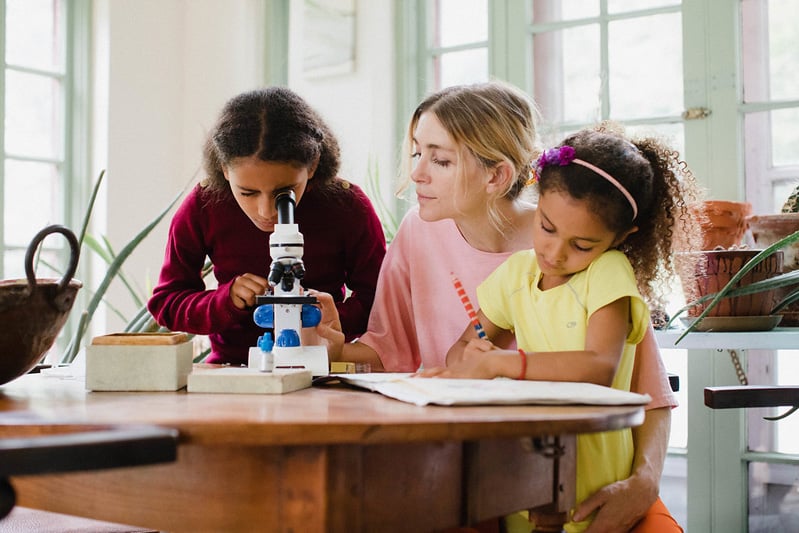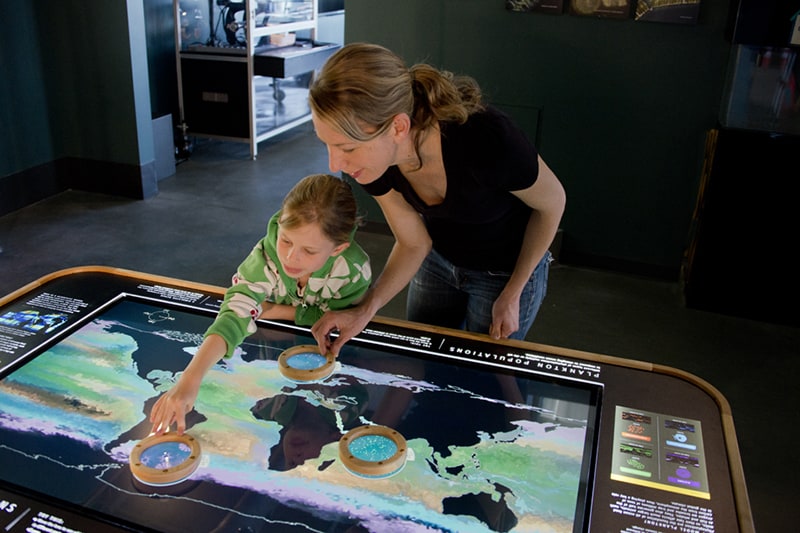
How to Foster A Love Of Science In Your Kids
Written by Mia Quagliarello
Photography by Molly Findlay, Photographed by Victoria of Motherhood Storybook
So, your kid loves science. “That’s great!” you might think before wondering what to do next. You’re not a scientist nor a teacher; you just know that you want this interest to flourish, outside of school, so that it may flower into a life-long passion for the natural world and maybe even a path in life. Or, heck, maybe you’re just psyched that junior’s into something that doesn’t revolve around a screen.
A child’s interest in science is clearly something to grab and to hold. But how can a non-academic parent cultivate that curiosity at home and in everyday life? That’s what we asked Dr. Jennifer Frazier (pictured below), a biologist at the Exploratorium in San Francisco, and mom of two kiddos (ages 9 and 12). For Frazier, science is more than a way of life—it’s a mindset.
“I try not to think of the world as divided into scientists and nonscientists,” she explains. “Whether a child becomes an industrial designer, or a dentist, or a firefighter, to me what science is about is fostering the ability to think critically about the world and, especially with nature, to notice how incredible the world around you really is.”
All children are born scientists, continues Frazier, and so a parent’s job is to develop those capacities while not squashing the kid’s natural sense of wonder and curiosity. “It’s about not getting in their way” as they question and explore the world. With that in mind, here are three easy things any parent can do to stoke a child’s passion for science.
Answer a question with a question. “A lot of parents feel like they need to have answers,” says Frazier. “But wouldn’t the world be boring if there were answers for everything and the world was already understood?” So, if your child asks why ice melts, you could retort, “Why do you think ice melts?” Frazier explains: “By asking the question back to them, you make them form a hypothesis—and it doesn’t even have to be that they come up with a good hypothesis.” You’re just modeling for them that instead of the world being filled with facts to be uncovered, you’re teaching them that there are a lot of other ways to look at something. “Be okay with not being the expert,” she adds, and watch their young minds fill up those spaces with possibility.
Foster noticing. “Fostering observation is a really important part of being a scientist,” suggests Frazier, who calls her own parents “amateur naturalists.” She remembers her folks always pointing things out to her as a child, like the color of the soil on a hike or the fact that a beach was covered with sand dollars. That kind of upbringing really helped Frazier notice aspects of her environment that might have otherwise slipped under the radar, and she does the same thing with her kids. If your child likes to write or draw, you could formalize their observation skills in a journal or sketchbook.
Have science-y stuff accessible around the house. Frazier makes sure to keep scientific artifacts that bring her joy and materials for young scientists to play at the ready. A microscope, Snap Circuits, rolls of tape, hunks of cardboard, strawberry baskets, vinegar, baking soda, food coloring, takeout containers—it’s all game for scientific exploration at home. “Letting them experiment with materials and giving them tools for observing is another thing that’s easy to do,” says Frazier. Collecting together can be fun, too. For example, she and her daughter have amassed about 100 different kinds of seeds, from giant pine cones on down, which they keep on a nature shelf at home.
Of course, there are times when looking up an answer is totally necessary and appropriate. But even then, says Frazier, you can look it up together and then talk about (or watch a video on) how someone did figure it out. “That can be a good part of the story if it’s not part of the resources you’re looking at,” she continues. “Then that models for them that somebody had this question and we didn’t know the answer. All the facts on Google and in all the books wouldn’t exist if someone didn’t take the time to figure them out.”
Extra Resources:
Science Snacks from the Exploratorium—a guide to road-tested activities you can do at home with easily available materials.
Sharing Nature With Children by Joseph Cornell—a great, approachable, classic book that many professional science educators recommend for parents.
This Pew Survey on why people become scientists, which highlights that inspiration comes from all places.
Snap Circuits—the aforementioned open-ended toy for a budding electrical engineer or coder.

Jennifer Frazier, Photographed by Amy Snyder, Exploratorium
Share this story




